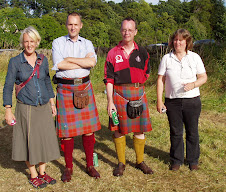I am nearly around round 84 of the
borders of the Unst Bridal Shawl – establishing the next set of
motifs. When one finishes off a set of them, and faces the uneventful
rounds that follow, the prospect is blissful. But “uneventful”
soon morphs into “tedious”. There are now really an awful lot of
stitches, and it seems to be all I can do to get around
once-and-a-bit in a day.
I got out that old book and looked at
the “Shetland shawl” pattern but am none the wiser. One casts on
a number of stitches, a multiple of the lace pattern provided –
what multiple, is up to the knitter. One knits for a while, on four
needles or two. I was puzzled by the idea of four needles – are we
knitting a tube here, to be cut open like Rams & Yowes? I think
not. I think the extra needles are just to facilitate more stitches,
although it's odd.
Then one might edge the whole thing
with a Van Dyke edging, found elsewhere in the book.
Now that I have written that down, I
feel it might be interesting to swatch both the lace pattern for the
shawl and the edging pattern. For authenticity, stick with Sharon
Miller. But this book – 184- something – is half-a-century
earlier than the first real Shetland lace printed patterns which
Sharon has found.
Horticulture
I got a pot of loose-leaf lettuce sown
yesterday, and a trough of courgettes and salad leaves with the
occasional nasturtium. The trough was intended for peas, but there
were none in the envelope. A click that failed to go through?
Courgettes are a rather boring vegetable when it comes to actual
eating, but they're more fun than anything to grow. And I think Helen
has a Greek recipe for stuffed courgette flowers which doesn't
involve deep-fat frying.
That leaves a tripod, a curious rusty
object which has been at the edge of the kitchen garden in
Strathardle forever. I thought it might add interest to the doorstep
by adding height. The idea is for more courgettes, which will spill
down the sides – but we've got to go to B&Q today in pursuit of
one of the bees in my husband's bonnet, so I might be able to seize
the opportunity to have a look at their seed-packet rack.



I think mutiple needles were common in the past. Is there not a fantastic huge white cotton petticoat with jaquard beasts and flowers - Dutch, I think - which must have been knitted in this way. ref "The Art of Knitting."
ReplyDeleteI'm intrigued by your post-cataract eye-issues - I've just had early stage cataracts diagnosed. Wouldn't you think they could use a plastic which did not go cloudy for this purpose?
Oh, yes, and your reference to the author of the sheep book as of farming stock. I lived on a sheep farm until I was fourteen. One tends to know a great deal about one's own breed - Cheviots, in our case - but not necessarily about others eg Herdwicks.even though the neighbours kept those.
Shandy and Jean, I think it is not the plastic that becomes cloudy, but a part of your eye that remains after the cataract surgery. Here is Mayo Clinic's explanation:
Deletehttp://www.mayoclinic.org/tests-procedures/cataract-surgery/basics/results/prc-20012917
Beverly in NJ
Good luck at B&Q! I'm envious of your horticultural efforts, my garden is much-missed now I am in a flat with no outside space. A pot of parsley on the kitchen windowsill isn't really enough, unfortunately.
ReplyDeleteHaving googled to find that courgettes are known here as zucchini, I need to say: the blossoms are delicious stuffed with cheese and deep-fried, but the squash themselves tend to produce way too much produce. A joke here is if you have one plant you will eventually resort to ringing people's doorbells, dropping off a bag of zucchini and running.
ReplyDelete